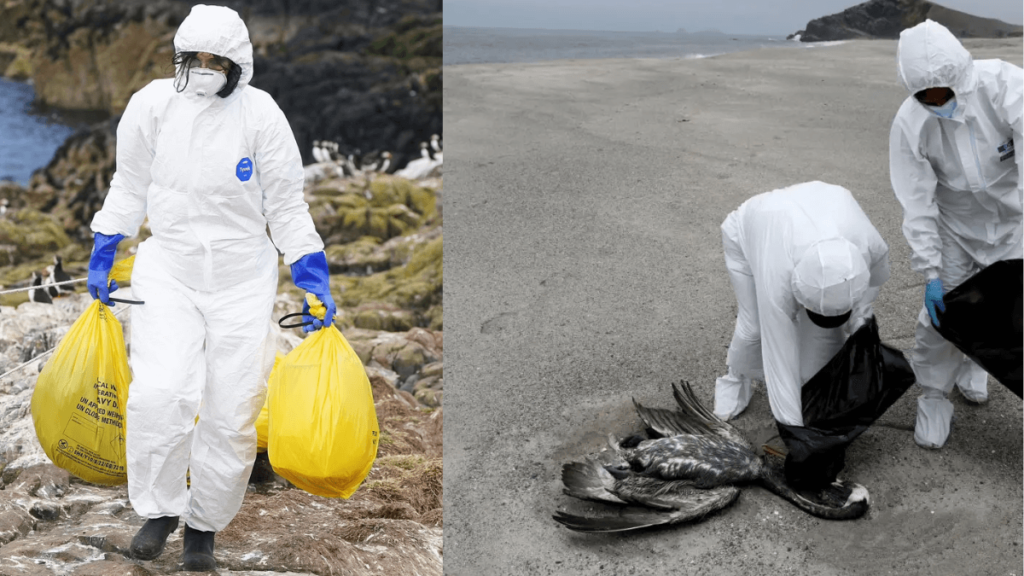According to Centre for Disease Control and Prevention, Avian Influenza is spreading fast, which is also commonly known as the Bird Flu. What’s worse? The H591 strain of Avian Influenza is more dangerous than the Covid pandemic which shook the whole world!
The H591 Bird flu virus has reached a serious threshold which is very concerning. Scientists suspect that Bird Flu might possibly the reason behind the death of hundreds of penguins in the Antartica and sea birds. Experts worry, it could be the next big pandemic which will have an uncontrolled global impact.

Although no cases have been cited as of now in India, this should not keep you from bracing yourself against it and taking necessary precautions. So, stay tuned to know how Bird Flu spreads, what are its symptoms, diagnosis, prevention and treatment.
What is Avian Influenza ( Bird Flu)?
According to WOAH( World Organisation for Animal Health), Avian Influenza is a type of flu that is mostly known to infect wild ( water) birds, but can also infect poultry ( domestic) birds and animals. This Bird Flu strain belongs to the family of A-type Influenza viruses.
Although it is uncommon for the Bird Flu to infect humans, the probability is not negative. The Bird Flu Virus has further subtypes as A ( H591), A( H7N9) and A ( H9N2), which can very well infect humans. If infected, these viruses can cause symptoms like pink ( mid) eye redness to serious flu-type conditions like respiratory issues or, even death.
Who Is At High Risk Of Avian Influenza ?
The people who are at high risk of developing a serious illness after Bird Flu infection are:
- If you’re pregnant;
- If you have poor immunity;
- If you’re a Senior Citizen.
We also want you to know that Bird Flu can infect you only if you come in contact with infected birds directly.
For example, if you consume or caress infected chickens, hens, turkeys, geese and ducks who have been in touch with the infected water bowl of the wild birds. The Bird flu infected birds leave their virus in their poop ( feces), mucus and saliva.
So, when a healthy domestic bird comes in contact with the wild bird’s infected saliva, they develop the infection too and that’s how it spreads further.
Symptoms and Causes of Avian Influenza
Although the symptoms of Bird Flu may slightly vary in each case, the most commonly observed symptoms are these:
- High fever ( 100 degrees and higher)
- Dry Cough
- Severe bodyache and muscle pain
- Soreness in throat
- Common cold or runny nose
- Feeling of nausea and puking ( vomiting)
- Diarrhea
- Conjunctivitis ( mild pink eye redness )
Apart from these symptoms, Avian Influenza can also show these respiratory conditions:
- Difficulty in breathing
- Pneumonia
- Severe respiratory problem
- Complete inability to breathe
Important : In rare and very severe cases of Bird Flu, the infected person also may encounter seizures or similar neurological issues, which could lead to multi-organ failure.
Treatment
Like we said above, the symptoms may seem mild, but we still advise getting the diagnosis and treatment by a qualified doctor.
At first, it might seem like a common viral infection, so the doctors prescribe antiviral medicines. At the slightest hint of any of the symptoms mentioned above, we strongly advise that you consult a doctor.
How To Prevent Bird Flu
The individuals who work at poultry farms are at the highest risk of getting infected with bird flu. In case you work in a poultry farm, ensure that-
- Wear gloves and mask at all times;
- Do not touch your eyes and hands, or face with dirty hands;
- Wash your hands thoroughly each time you touch the birds;
- Keep a separate set of clothing for the farm.
In case you notice the bird flu symptoms in any of the farms, please inform the community health providers immediately so that the further spread of the same can be prevented.
How to take care if you have Bird Flu
Lastly, what to do if you are infected with bird flu? Well, here is how you can take care of yourself:
- Take the medication as prescribed;
- Stay well-hydrated
- Take complete rest
- Stay at home
- Improve your Oxygen levels naturally by keeping more indoor plants at home
- Wear a mask and wash hands frequently to prevent the spread of the virus to other family members.
Take care!
![bird_flu_2[1]](https://theindianbugle.com/wp-content/uploads/2024/04/bird_flu_21-696x392.png)
Prevention is cure.Be safe
Yes, please share the information with your family and friends. Be safe.